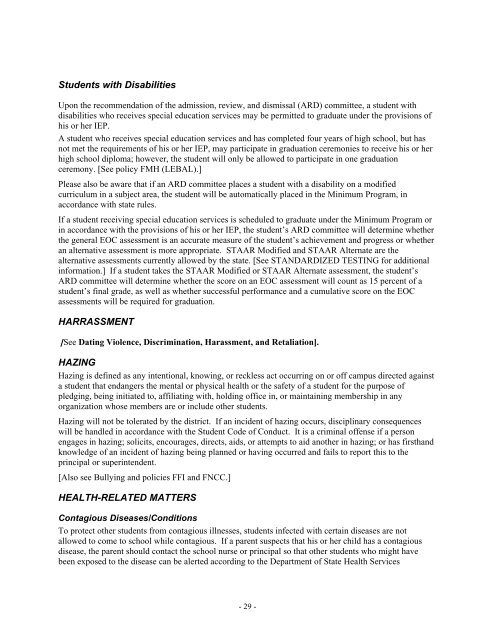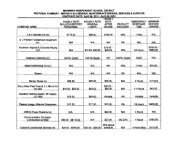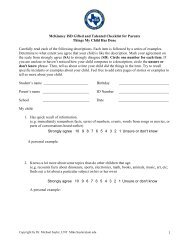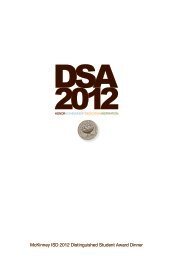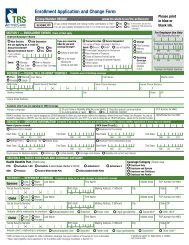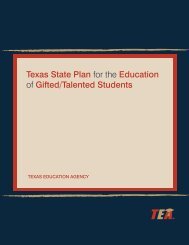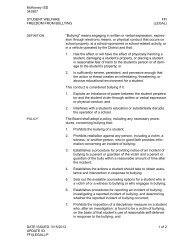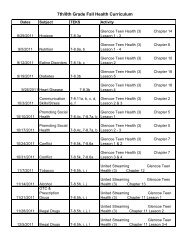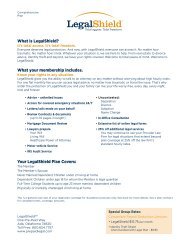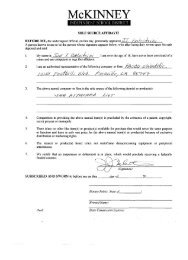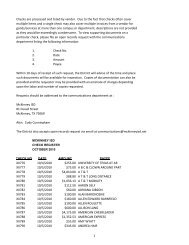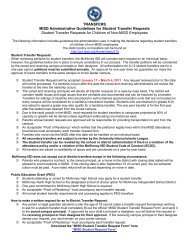2011-2012 Student Handbook - McKinney Independent School District
2011-2012 Student Handbook - McKinney Independent School District
2011-2012 Student Handbook - McKinney Independent School District
- No tags were found...
You also want an ePaper? Increase the reach of your titles
YUMPU automatically turns print PDFs into web optimized ePapers that Google loves.
<strong>Student</strong>s with DisabilitiesUpon the recommendation of the admission, review, and dismissal (ARD) committee, a student withdisabilities who receives special education services may be permitted to graduate under the provisions ofhis or her IEP.A student who receives special education services and has completed four years of high school, but hasnot met the requirements of his or her IEP, may participate in graduation ceremonies to receive his or herhigh school diploma; however, the student will only be allowed to participate in one graduationceremony. [See policy FMH (LEBAL).]Please also be aware that if an ARD committee places a student with a disability on a modifiedcurriculum in a subject area, the student will be automatically placed in the Minimum Program, inaccordance with state rules.If a student receiving special education services is scheduled to graduate under the Minimum Program orin accordance with the provisions of his or her IEP, the student’s ARD committee will determine whetherthe general EOC assessment is an accurate measure of the student’s achievement and progress or whetheran alternative assessment is more appropriate. STAAR Modified and STAAR Alternate are thealternative assessments currently allowed by the state. [See STANDARDIZED TESTING for additionalinformation.] If a student takes the STAAR Modified or STAAR Alternate assessment, the student’sARD committee will determine whether the score on an EOC assessment will count as 15 percent of astudent’s final grade, as well as whether successful performance and a cumulative score on the EOCassessments will be required for graduation.HARRASSMENT[See Dating Violence, Discrimination, Harassment, and Retaliation].HAZINGHazing is defined as any intentional, knowing, or reckless act occurring on or off campus directed againsta student that endangers the mental or physical health or the safety of a student for the purpose ofpledging, being initiated to, affiliating with, holding office in, or maintaining membership in anyorganization whose members are or include other students.Hazing will not be tolerated by the district. If an incident of hazing occurs, disciplinary consequenceswill be handled in accordance with the <strong>Student</strong> Code of Conduct. It is a criminal offense if a personengages in hazing; solicits, encourages, directs, aids, or attempts to aid another in hazing; or has firsthandknowledge of an incident of hazing being planned or having occurred and fails to report this to theprincipal or superintendent.[Also see Bullying and policies FFI and FNCC.]HEALTH-RELATED MATTERSContagious Diseases/ConditionsTo protect other students from contagious illnesses, students infected with certain diseases are notallowed to come to school while contagious. If a parent suspects that his or her child has a contagiousdisease, the parent should contact the school nurse or principal so that other students who might havebeen exposed to the disease can be alerted according to the Department of State Health Services- 29 -


